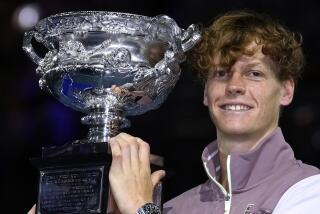Austria Cup Tennis Tournament : Mertins’ Waiting Game Works Once, Not Twice
- Share via
When West German Werner Mertins took center court at Lindborg Racquet Club Saturday for the No. 1 singles match of the Austria Cup championship, his strategy was to let his opponent bring the game to him and to feast on his mistakes.
It worked as Mertins outlasted Canadian Ken Sinclair, 7-5, 7-6, in the best match of the Huntington Beach club’s 55-and-over veterans championships.
But Mertins also made the biggest mistake of the day. He tried to use the same strategy in doubles, and it backfired.
The aggressive, serve-and-volley tactics employed by the Canadian team of Sinclair and Lorne Main proved too much for Mertins and partner Augusta Lutzenkrirchen. It took the Canadians only 45 minutes to dispose of the West Germans, 6-1, 6-4, to win their second consecutive Austria Cup, 2-1.
“It was a clash of styles,” Main said. “In Europe, they’re used to playing doubles by dinking it around. But we play a kind of doubles that is similar to the American way. We use an aggressive, take-it-to-’em approach. It’s a faster game.”
In the first set, the West Germans scored only 11 points in seven games.
“They did not allow us to play our game,” Mertins said through an interpreter. “Their serve-and-volley made us work too hard. We made a lot of unforced errors.”
“They just kept applying the pressure,” Lutzenkrirchen said. “They never stopped coming at us.”
The Canadian duo has played together for 13 years, and, with two victories and one other trip to the Austria Cup finals in the last three years, is quickly forging a dynasty. The two West Germans had never played doubles together.
“Each of us knows what the other is going to do,” Main said. “We’ve played together for so long, we know each other’s moves. We don’t need signals. But (the West Germans) didn’t have that luxury. It looked like they were making it up as they went along, and when you do that, it’s going to cause some mistakes.”
Lindborg’s hardcourt also hurt the West Germans.
“(The Canadians) play on this surface 12 months of the year,” Mertins said. “But in Europe, we almost never play on this surface. It’s so different from clay. It bounces differently. The bounce is not as predictable. It’s something you have to adjust to.”
But Mertins was clear to make the point that none of those factors was the difference in the championship.
“The better team won,” he said.
The veterans tournament ends today with the finals of the 45-and-over Dubler Cup between the United States and West Germany. On Saturday, the U.S. defeated Italy, 3-0, and West Germany defeated Australia, 2-1.
In the first Austria Cup singles match, Canada’s Main had little trouble in defeating Hans Overhausen, 6-3, 6-3. But the second match provided plenty of drama.
Sinclair’s serve was bigger and his volleys usually were more accurate. But his errors also were more frequent. At the end of a long rally in which he had hit an overhead smash or had lunged to save a dying winner, Sinclair invariably would hit one into the net or beyond the baseline. He had Mertins on the ropes twice late in the first set, but his untimely mistakes allowed the West German to win, 7-5.
“He kept me on the defensive,” Sinclair said. “I never got into the match the way I usually do. I was making too many unforced errors, and he took advantage of them.”
Early in the second set, Sinclair seemed to find his game. He led, 4-1, when Mertins, who had appeared tired, rallied to win five of seven games to force a tiebreaker.
“I thought I had it going, and then he started banging back,” Sinclair said. “He just took control, and I was lucky just to hang around for the tiebreaker.”
Mertins had four match points before forcing Sinclair long to win the tiebreaker, 14-12, and end the grueling 95-minute match.
“I was lucky to stay around as long as I did,” Sinclair said. “(Mertins) made a few mistakes that kept it going.”
But Mertins also felt lucky.
“It was a great match,” he said. “But for me, the win was as much psychological as physical. A couple of years ago in Europe, I played Sinclair in a quarterfinal match and beat him. So I knew I could. When he had me down, I kept pushing myself, because I knew I could win.
“Because of that confidence, I played more decisively in the key moments. I was more relaxed.”
More to Read
Go beyond the scoreboard
Get the latest on L.A.'s teams in the daily Sports Report newsletter.
You may occasionally receive promotional content from the Los Angeles Times.










